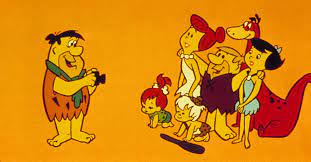The Flintstones, one of the most iconic animated families in television history, captivated audiences for over four decades since its debut in 1960. The prehistoric sitcom created by William Hanna and Joseph Barbera showcased the entertaining lives of the Stone Age-dwelling Flintstone and Rubble families. While the show presented various aspects of their lives, from work to family dynamics, one widely debated topic among fans is whether the Flintstones celebrated Christmas.
The Flintstones transported viewers back to a time when dinosaurs roamed the earth alongside our Stone Age ancestors. They depicted the lives of Fred Flintstone, a hardworking yet often carefree bronto-crane operator at the Slate Rock and Gravel Company, and his best friend and neighbor, Barney Rubble. The show aimed to entertain audiences with its clever wit, humorous situations, and satirical take on modern culture using the backdrop of a primitive civilization.
Considering the Flintstones’ setting, it is essential to note that Christmas, as we know it today, has its roots in the Christian tradition. However, it is a widely celebrated holiday that has evolved to include a variety of customs and practices around the world. The primary question arises from whether the Flintstones celebrated a similar holiday, or if they had their unique Stone Age festivities.
While the Flintstones did not explicitly celebrate Christmas in the show, they did have their holiday-themed specials. The series introduced a holiday known as “Christmastone” in one of its fifth-season episodes, titled “Christmas Flintstone.” This cleverly created holiday blended elements of both Christmas and the celebration of the Winter Solstice. The episode centered around Fred Flintstone’s quest to play Santa Claus for his daughter, Pebbles, and her friends while struggling to earn the necessary money as Santa.
Although the Flintstones did not partake in a Christmas celebration in the traditional sense, they did give a nod to the holiday season, showcasing the importance of gift-giving, generosity, and family bonds during this time of the year. The episode fittingly encapsulated the spirit of the holiday, emphasizing love, kindness, and generosity.
The choice to create a special holiday like Christmastone instead of opting for a direct Christmas celebration may be attributed to the show’s desire to remain neutral and inclusive. By avoiding religious connotations tied to Christmas, the creators ensured that the Flintstones appealed to a broader audience, regardless of their religious beliefs. It allowed viewers from various backgrounds to find something relatable and enjoyable in the show, promoting a sense of unity and camaraderie.
Moreover, the Flintstones’ approach to holiday celebrations had a simplicity that resonated with audiences. They focused on the core principles of togetherness, love, and joy, embodying the essence of Christmas without explicitly aligning with its religious origins. This approach allowed the show to maintain a timeless quality, making it enjoyable for generations of viewers.
It is worth noting that despite the absence of explicit Christmas celebrations, the Flintstones did incorporate elements of modern life into their Stone Age existence. Throughout the series, they showcased consumerism, advertising, and even inventions not typically associated with primitive societies. This blending of modern and prehistoric elements created a unique backdrop for their adventures, making the show relatable and humorous for viewers of all ages.
Rare Synchronization: The Frequency of Christmas Falling on a Sunday
In conclusion, while the Flintstones may not have celebrated Christmas outright, they did embrace the spirit of the holiday through their specially created holiday known as Christmastone. By doing so, the creators of the show ensured that the Flintstones remained inclusive and relatable to audiences of all backgrounds. The Flintstones’ approach to holiday celebrations emphasized love, togetherness, and generosity, capturing the essence of the Christmas season without directly aligning with its religious origins. This clever portrayal showcased their ability to entertain generations and contributed to their enduring status as one of the most beloved animated families in television history.



Add a Comment